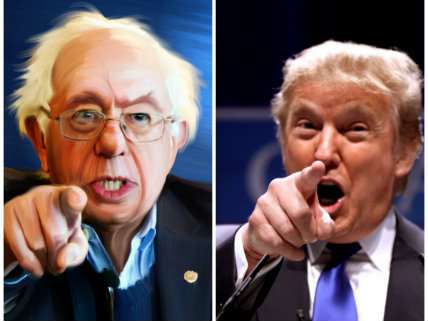Surprising Similarities Between Bernie Sanders and Donald Trump
On the issues, there's more overlap between the two 2016 presidential candidates than you might expect.

The surprise stories of the presidential campaign so far have been the billionaire and the anti-billionaire. They are more alike than you might think.
The billionaire, Donald Trump, has been topping polls on the Republican side. And the anti-billionaire, Sen. Bernard Sanders, independent socialist of Vermont, has been drawing large crowds and emerging as the most formidable challenger to Hillary Clinton for the Democratic presidential nomination.
A front-page New York Times dispatch about a Sanders campaign appearance in Iowa gave a flavor of the Sanders pitch in the candidate's own words: "What this campaign is doing is sending a loud and clear message to the billionaire class: And that is that their greed is destroying the United States of America…This country belongs to all of us—and not just a handful of billionaires."
Trump's appeal to the white middle-income voters that Sanders also draws from has journalists scrambling to understand what is happening. "Why on earth would they support a billionaire?" asks the New Yorker's James Surowiecki. Surowiecki answers, in part, that, "Trump's unabashed revelling in his wealth works to his benefit, since it makes him seem like an ordinary guy who can't get over how cool it is to be rich." Also, "Trump's riches allow him to portray himself as someone who can't be bought."
The University of Tennessee law professor Glenn Harlan Reynolds, who blogs as Instapundit, writes in his USA Today column that "Trump's rise is, like that of his Democratic counterpart Bernie Sanders, a sign that a large number of voters don't feel represented by more mainstream politicians. … Trump and Sanders have come forward to claim the orphaned vote."
On issues, there's more overlap between the Republican billionaire Trump and the socialist anti-billionaire Sanders than you might expect.
On immigration, both Trump and Sanders sound restrictionist notes. Trump rose to political prominence in part with his comments accusing Mexico of sending criminals and rapists to the United States. Sanders warns that immigration depresses American wages and contributes to youth unemployment.
On trade, Sanders and Trump both oppose the North American Free Trade Agreement (NAFTA) that was one of President Clinton's great achievements. Trump called NAFTA a "disaster" and Sanders described it as a scheme to allow "multinational corporations" to "exploit desperate third world workers." They also oppose the Trans-Pacific Partnership agreement. Hillary Clinton helped to craft that agreement as Secretary of State (though she has been noncommittal about it as a candidate). Governor Jeb Bush, by contrast, is a big supporter of free trade.
On guns, Sen. Sanders was initially elected to Congress with the support of the National Rifle Association. Pro-gun-control journalists denounce him as a "gun nut." Trump, likewise, has been running on what he describes as a strong pro-Second Amendment stance.
Even the personal lives of Mr. Sanders and Mr. Trump have certain similarities.
Both are from the outer boroughs of New York City. Sanders is from Brooklyn; Trump, from Queens. Both are children of immigrants. Sanders' father was born in Poland; Trump's mother is from Scotland.
Neither candidate served in the Vietnam War. Trump had student deferments and a medical deferment. Sanders reportedly applied for conscientious objector status; by the time the application was rejected he was "too old to be drafted."
Trump is on his third marriage. Sanders is on his second marriage and has a son from a relationship with a third woman.
They both have gravity-defying hair. "Bernie Sanders has the best hair in Congress," Buzzfeed declares. "Bernie Sanders has amazing hair," The Washington Post concurs. The Daily Beast calls Donald Trump's "the world's most notorious male haircut." Compared to the "impeccably coiffed," Mitt Romney, who reportedly paid $70 for a trim, or the ever-changing hairstyles of Hillary Clinton, who recently got her cut at a Manhattan salon that charges $600, the flyaway comb-overs of Messrs. Sanders and Trump have at least the appearance of authenticity. That's about as close as any politician can get to actual genuineness.
The press likes Trump because he's lively and entertaining but hates him because they think he's coarse and unserious. The press likes Sanders because he's their hope for avoiding the boredom of a Hillary cakewalk, but most of them don't think a 73-year-old socialist can win the presidency.
Could Mr. Trump and Mr. Sanders unite on a third-party ticket? Unlikely. The Washington Free Beacon satirically suggests that such a ticket is impossible because the two men "are (almost certainly) the same person."
Sanders and Trump can affect the outcome, though. Don't be surprised to find other campaigns looking for ways to capture their audiences. Trump already boasted in the Republican debate that if it weren't for him, the other candidates wouldn't have been talking about illegal immigration. Sanders will probably make the same claim about income inequality or wealth. There's difference, though, between casting blame—whether at immigrants or billionaires—and actually leading the country toward positive change. The challenge for other candidates looking to tap into the Trump-Sanders frustration with politics-as-usual will be to find some way to channel it in the direction of reform.


Show Comments (41)